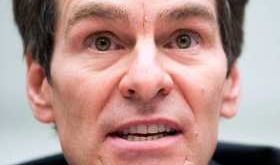How to learn a new language — drink alcohol! Being more or less conversant in seven languages, yours truly knows from own experience that learning a new language isn’t easy. It sure takes time and effort but is worth every minute. And as science has shown — it improves your cognitive and sensory abilities. Now, speaking a foreign language is often intimidating. But as science — again — has shown: drinking alcohol helps … [embedded content]...
Read More »Epiphany (personal)
[embedded content] div{float:left;margin-right:10px;} div.wpmrec2x div.u > div:nth-child(3n){margin-right:0px;} ]]> Advertisements
Read More »P-hacking and data dredging
P-hacking and data dredging P-hacking refers to when you massage your data and analysis methods until your result reaches a statistically significant p-value. I will put it to you that in practice most p-hacking is not necessarily about hacking p-s but about dredging your data until your results fit a particular pattern. That may be something you predicted but didn’t find or could even just be some chance finding that looked interesting and is amplified...
Read More »John Searle and the sexual harassment scandals at UC Berkeley
John Searle and the sexual harassment scandals at UC Berkeley A sexual harassment scandal casts a shadow on University of California, Berkeley and academic philosophy. John R. Searle, one of the world’s most renowned philosophers, has been named in a sexual harassment lawsuit launched by a former student, Joanna Ong. As Katie J.M. Baker of BuzzFeed reports: “The lawsuit, which lists Searle and the Regents of the University of California as defendants,...
Read More »The atomic hypothesis and the limits of econometrics
The atomic hypothesis and the limits of econometrics Our admiration for technical virtuosity should never blind us to the fact that we have to have a cautious attitude towards probabilistic inferences in economic contexts. Science should help us disclose causal forces behind apparent ‘facts.’ We should look out for causal relations, but econometrics can never be more than a starting point in that endeavour since econometric (statistical) explanations are...
Read More »Nationalekonomer spekulerar
div{float:left;margin-right:10px;} div.wpmrec2x div.u > div:nth-child(3n){margin-right:0px;} ]]> Advertisements
Read More »Der Himmel über Berlin (personal)
Der Himmel über Berlin (personal) [embedded content] I only left Berlin three days ago. I already wish I was there again. Watching Peter Handke’s and Wim Wenders’ masterpiece — a movie that touches my heart more than any other — takes me back to the city I learned to love already back in the 1970’s. Als das Kind Kind war, ging es mit hängenden Armen, wollte der Bach sei ein Fluß, der Fluß sei ein Strom, und diese Pfütze das Meer. Als das Kind Kind war,...
Read More »Macroeconomics — religion or science?
Macroeconomics — religion or science? Macroeconomists build theories codified by systems of equations. We use those equations to explain patterns in economic data. Unlike experimental sciences, chemistry and physics for example, macroeconomists cannot easily experiment. That does not mean that we cannot challenge existing theories, but it makes it much harder. Like astronomers waiting for the next supernova to explode; macroeconomists must wait for big...
Read More »Big — and not so big — ideas in macroeconomics
Big — and not so big — ideas in macroeconomics In Athreya’s world, and that of a large part of the academic macroeconomics profession, macroeconomics does indeed begin with Walras, and the first modern development in the field was the formalization of Walras’ model by the economic theorists Arrow, Debreu and MacKenzie in the 1950s. The big subsequent development is the integration of growth theory into the static ADM framework to generate the modern dynamic...
Read More »The ‘tiny little problem’ with Chicago economics
The ‘tiny little problem’ with Chicago economics Every dollar of increased government spending must correspond to one less dollar of private spending. Jobs created by stimulus spending are offset by jobs lost from the decline in private spending. We can build roads instead of factories, but fiscal stimulus can’t help us to build more of both. This form of “crowding out” is just accounting, and doesn’t rest on any perceptions or behavioral assumptions. John...
Read More » Lars P. Syll
Lars P. Syll







